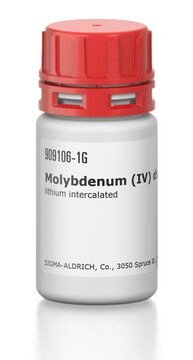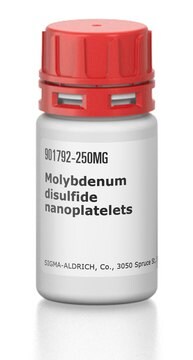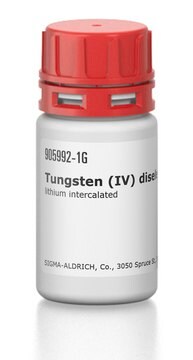778087
Molybdenum(IV) selenide
-325 mesh, 99.9% trace metals basis
Synonym(s):
Molybdenum diselenide
About This Item
Recommended Products
Quality Level
Assay
99.9% trace metals basis
form
powder
particle size
-325 mesh
mp
>400 °C
application(s)
battery manufacturing
SMILES string
[Mo].[Se].[Se]
InChI
1S/Mo.2Se
InChI key
MHWZQNGIEIYAQJ-UHFFFAOYSA-N
Related Categories
Application
Signal Word
Danger
Hazard Statements
Precautionary Statements
Hazard Classifications
Acute Tox. 3 Inhalation - Acute Tox. 3 Oral - Aquatic Acute 1 - Aquatic Chronic 1 - STOT RE 2
Storage Class Code
6.1C - Combustible acute toxic Cat.3 / toxic compounds or compounds which causing chronic effects
WGK
WGK 3
Flash Point(F)
Not applicable
Flash Point(C)
Not applicable
Choose from one of the most recent versions:
Already Own This Product?
Find documentation for the products that you have recently purchased in the Document Library.
Articles
Novel Graphene‑Based Nanostructures Production, Functionalization, and Engineering
Catalytic water splitting produces hydrogen crucial for renewable energy, petroleum refining, and chemical industry applications like methanol production.
Our team of scientists has experience in all areas of research including Life Science, Material Science, Chemical Synthesis, Chromatography, Analytical and many others.
Contact Technical Service








